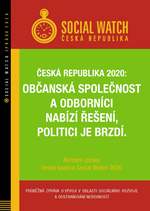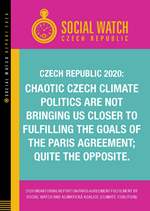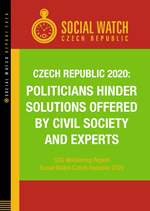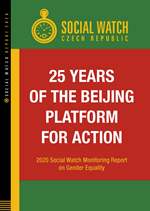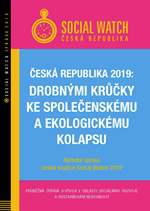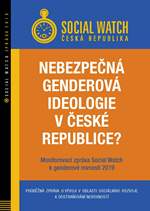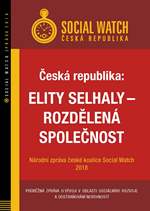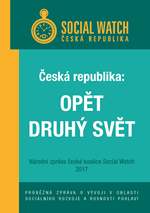Czech Republic
Published on Fri, 2022-07-29 17:01
This year's report of the Social Watch for the Czech Republic focuses on three areas: the economy, health and care and socio-economic transformation. The report responds to the ramifications of the Covid-19 pandemic, but it also reflects on issues related to the conflict in Ukraine, in particular the impact of rising energy prices and inflation. In the report, economist Ilona Švihlíková criticises the absence of national economic policy and chaotic conduct of the governments (there was a change in administrations after last year’s October elections) throughout the pandemic, as well as its unsystematic and antisocial tax policy. |
Published on Tue, 2020-11-03 00:00
Social Watch Czech Republic releases an annual report evaluating the progress of the Czech Republic towards reaching the UN Sustainable Development Goals. The report is divided into five sections: people, planet, prosperity, peace, and partnership. The Czech Republic is failing to meet many of the UN sustainable development targets, with progress only visible in certain areas, according to a report last week from Social Watch CZ, a non-governmental organization that monitors compliance with the goals. |
Published on Wed, 2020-09-30 00:00
Our current civilization could have emerged only thanks to suitable climatic conditions which arose with the end of the last ice age about 10 000 years ago. A stable and favourable climate enabled people to settle, build settlements, engage in agriculture, and develop technically and culturally. Approximately 200 years ago, the discovery that it was possible to obtain energy through burning fossil fuels led to an industrial revolution, to a further acceleration of technical progress, and to a huge increase in the world’s population as well. |
Published on Tue, 2020-07-21 00:00
Five years ago, as part of the United Nations Summit on Sustainable Development, all UN member states ratified the Sustainable Development Goals. In 2017, the government of the Czech Republic ratified the strategic document “Czech Republic 2030” whose goal was to improve the quality of life across all the regions and to put Czechia on a path to development which would be sustainable in its social, economic and environmental impacts. |
Published on Thu, 2020-06-18 00:00
This year marks the 25th anniversary of the Fourth World Conference on Women held in 1995 where the Beijing Declaration and Platform for Action were first adopted embodying the goals and recommended actions for improving women‘s access to their rights in 12 key areas. The presented monitoring report of the Czech Social Watch Coalition on Gender Equality focuses in four studies on the following areas of the Beijing Platform for Action: women and poverty, violence against women, women and economic inequality, and women in decision-making positions. |
| Published on Wed, 2019-09-18 00:00 |
| Published on Wed, 2019-07-03 00:00 |
| Published on Thu, 2017-09-21 00:00 |
Published on Fri, 2017-09-15 14:42
When the democratization process started, quarter of a century ago, the Czech Republic hoped to raise its social, environmental, economic and legal realities to “First World” standards. The Czech Social Watch coalition concluded in its alternative report to the United Nations that “we are back in the Second World”. The chapters on People, Planet, Prosperity, Peace and Justice and Partnerships provide evidence of an increasing gap between East and West in Europe. “Apart from indisputable internal responsibility, international cooperation has been lacking and it is not surprising that trust in the EU is decreasing in new member states”. The report complains about underrepresentation of Eastern Europe internationally and sees “ethnically motivated murders of Czech and Polish workers in Great Britain by neo-Nazis in connection with Brexit” as “only the tip of the iceberg”. |


